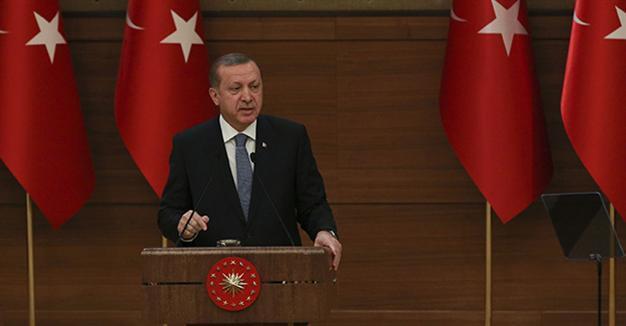Keep PYD out of Syria truce deal: Erdoğan
ANKARA

AA Photo
Syria’s Democratic Union Party (PYD) and the People’s Protection Units (YPG) should be excluded from a recently declared cessation of hostilities in Syria, just like the Islamic State of Iraq and the Levant (ISIL), Turkish President Recep Tayyip Erdoğan has said.“The PYD and the YPG need to be out of the scope of the cease-fire, just like Daesh is,” Erdoğan said during a speech to village headmen in Ankara on Feb. 24, using an Arabic acronym for ISIL.
“Everybody should accept that the PYD and the YPG are offshoots of the PKK [outlawed Kurdistan Workers’ Party],” he said. “Should this organization detonate its bomb somewhere other than Ankara in order to be recognized as a PKK offshoot?”
A U.S.-Russia joint cease-fire deal announced on Feb. 22 is to take effect in Syria on Feb. 27, but the “cessation of hostilities” does not include ISIL and the al-Nusra Front, the main jihadist factions.
The Turkish president also underlined that denying the organizations’ status as terror groups, despite Turkey’s position on the matter, was incompatible with the “spirit of an alliance.”
An ongoing rift occurred between NATO allies Turkey and U.S. over the designation of the PYD and YPG. While Turkey consider them as terrorist organizations, the U.S. sees them an important partner in the fight against ISIL.
On Feb. 23, President Barack Obama’s special envoy to the global counter- ISIL coalition, Envoy Brett McGurk, stressed Turkey’s important role in the fight against ISIL, stating it was impossible for the United States to “succeed without Turkey,” during a White House press briefing.
“We have to work on this closely together. We can’t succeed in this without Turkey,” McGurk said in response to a remarks questioning Turkey’s role in the cessation of hostilities in Syria, in regards to its shelling of YPG targets across its border.
McGurk stressed that Turkish cooperation has “made a real difference” on the border and that the close partnership between Turkey and the U.S. is set to continue.
Meanwhile, Pentagon Press Secretary Peter Cook said Feb. 23 that Turkey’s shelling of YPG forces in northern Syria would be an “ongoing topic of conversation” between the two countries.
“We’ll continue to work closely with the Turks in the fight against ISIL and, of course, their own security situation. It remains an ongoing topic of conversation,” said Cook during a Department of Defense Press Briefing.
Meanwhile, U.S. Secretary of State John Kerry said if a political transition to a government to replace the current administration does not unfold in Syria, there were options, adding that it would be hard to hold the country together if the fighting did not stop after a cease-fire.
“There is a significant discussion taking place now about Plan B if we don’t succeed at the table,” Kerry he told the Senate Foreign Relations Committee in Washington on Feb. 23.
The next month or two would show if that transition process was serious and Assad would have to make “some real decisions about the formation of a transitional governance process that’s real,” Kerry said.
On the other camp, Syrian President Bashar al-Assad assured Russian counterpart Vladimir Putin of his government’s readiness to respect a ceasefire deal brokered by Moscow and Washington, the Kremlin said on Feb. 24.
The Kremlin said the two leaders discussed the deal in a phone call and that Assad noted that the proposals laid out in the agreement were an “important step in the direction of a political settlement.”
“In particular, [Assad] confirmed the readiness of the Syrian government to facilitate the establishment of a ceasefire,” it said in a statement.
















